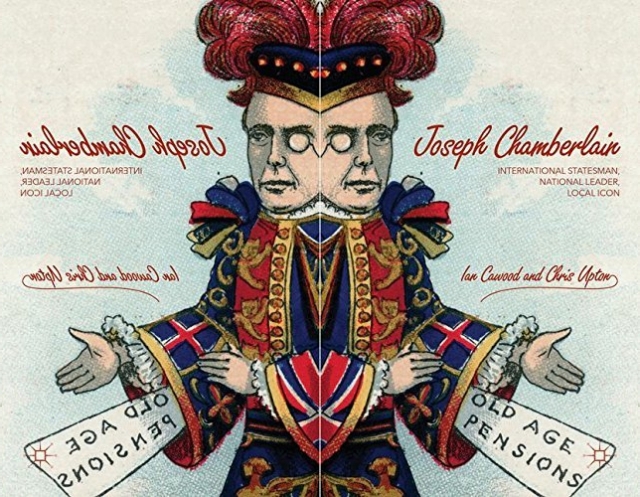Joseph Chamberlain International Statesman
Book Review

National Leader & Local Icon
Joseph Chamberlain International Statesman, National Leader, Local Icon, Ian Cawood and Chris Upton, (eds.), Palgrave Macmillan, 2016, £63, hardback, ISBN 9781137528841
Sadly Chris Upton died in the final stages of the project which generated this collection of essays, namely the Joseph Chamberlain Centenary conference held at Newman University Birmingham, in July 2014, but the volume includes a collaborative essay on ‘Joseph Chamberlain and the Birmingham Satirical Journals, 1876-1911’ which Chris wrote with Ian Cawood and which is a worthy tribute to his memory as is the book as a whole which is dedicated to his memory. Indeed, the book amply fulfils the commendation of the distinguished reviewers whose comments appear on the book’s cover. David Cannadine pronounces the collection of essays ‘the best book on Joseph Chamberlain since Peter Marsh’s magisterial biography’ which is ‘by turns scholarly and spiky, sceptical and sympathetic, and always highly entertaining to read’. Vernon Bogdanor attributing the ‘idea that the state has a social responsibility for all of its citizens’ to Chamberlain hails the volume as ‘an excellent approach to his career’ whilst Lord Alan Beith, contributing the perspective of a twenty-first century Liberal Democrat in his perceptive foreword, attributes to Chamberlain ‘an agenda of municipal improvement which has never since been absent from the Liberals or Liberal Democrats and which late twentieth-century radical Liberals developed into ‘a doctrine of community politics’.
An opening chapter by Peter Marsh identifies Chamberlain’s achievement ‘in pushing the social expectations of government in Britain beyond the narrow confines of Gladstonian finance’. Successive chapters then deal specifically with Joseph Chamberlain and foreign policy (T.G. Otte); his reputation in South Africa (Jackie Grobler); his friendship with Richard Seddon, a close ally in the cause of closer imperial unity between 1897 and 1906; his relationship with William Gladstone (Roland Quinault) and Leonard Courtney (Eleanor Tench) and Gorge Dixon (James Dixon); a social history of Joseph Chamberlain and the tariff Reform Campaign (Oliver Betts) and illuminating essays on Birmingham’s Protestant Nonconformity in the late nineteenth and early twentieth centuries providing a theological context for the ’Civic Gospel’ (Andy Vail) and a concluding assessment by Ian Cawood on his reputation and legacy. A detailed differentiated bibliography including primary printed sources, secondary sources and index, which indicates how strongly the Birmingham dimension in all its diversity featured in his extraordinary political career, add to the book’s usefulness particularly as an introductory text for students, but also for anyone interested in the local history of his home city.

